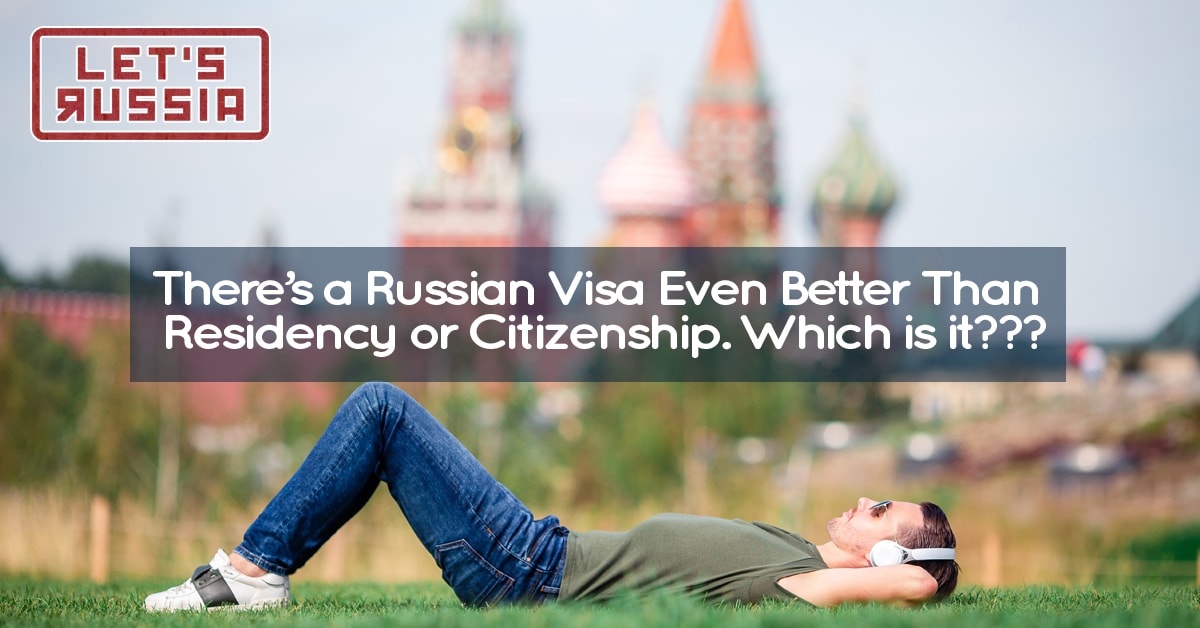There’s a Russian Visa Even Better Than Residency or Citizenship. Which is it?
Having had almost every type of visa there is, I certainly know the woes of Russian visas. You have to get registered every time you enter Russia. Some visas limit you to single or double entries. What happens when you want to visit Russia a third time? You have to get a new visa. For many nationalities, a Russian business visa for multiple entries is limited to a 90-day stay out of a 180-day period. That means, if you want to extend your stay, you’d need to leave the country and wait or leave Russia and get a new visa, thereby annulling the valid visa you already have. In case you’re offered work and you don’t have a work visa, you’d need to leave Russia and apply for a work visa to legally be employed in Russia.
For these reasons, and many more no doubt, many long-term visitors to Russia look for ways to apply for temporary or permanent residency and then potentially Russian citizenship. This alleviates some of the issues with visas, of course. However, even having legal residency brings on new bureaucratic nuisances. For instance, you’ll still have yearly reporting to do, one such requirement involves reporting financial assets in your name even outside of Russia. Another downside of residency is for companies looking to hire you. Having residency in Russia qualifies you to receive social benefits, for which your future employer will be required to contribute on your behalf. If your work contract is based on a high enough salary, this could be a pretty penny for your employer, more so if you succeeded in gaining citizenship, especially if you prefer getting a completely official salary on the books, which can be tough for some companies in Russia.
In most circumstances you can’t have it both ways; you have to compromise somewhere. But there is a legitimate way to rid yourself of the annoyances of visa runs and visa renewals along with the bureaucracy of residency or citizenship in Russia. I’m even surprised this option is so often overlooked. The answer for many people could be an HQS work visa. HQS stands for Highly-qualified Specialist. The HQS visa is quite often used for international companies sending their employees on assignments abroad but it can be used for small businesses too. It can even be used in a company that a foreigner starts and uses that company to issue an HQS work visa for the founder.
The HQS visa allows the foreigner to avoid registration for up to 90 days from the moment he or she enters Russia. This is a nice burden lifted from HQS visa holders because in July 2019 the law became stricter on places where foreigners could register. If you travel in and out of Russia often, you completely avoid the registration process. An HQS visa also puts its holder at a mere 13% income tax rate from day one and better yet, it costs the company practically nothing to employ a team member with HQS status in terms of social contributions to the Russian government. This is where it gets even better considering the alternatives accessible to foreigners.
If a foreigner is working in Russia on a regular work visa, the foreigner pays 30% income tax until he becomes a tax resident after 183 days of being in Russia. Then, he’ll start paying income tax at a rate of 13% and can claim the difference from the first 6 months’ payments to be returned, but only if he remains a tax resident. If he leaves Russia due to, for example, a temporary or short assignment, then he wouldn’t be able to claim back the difference of 17% income tax already paid. On the employer’s side, they pay 23.8% on top of the foreign employee’s salary to the government in social contributions. Don’t underestimate the toll Russian bureaucracy can take on you.
The HQS visa avoids all of this. There’s no counting days until you become a tax resident. No going to the tax authorities to get a refund. No registering within seven days after arriving in Russia. No waiting the long two to four months of processing a regular work visa. An HQS visa is granted within 1-2 months along with a visa invitation letter. Family members and dependents can get an accompanying HQS visa and it’s granted for a period of up to three years. The HQS visa allows foreigners a faster track to residency and citizenship and it can be renewed while in Russia if a work contract is terminated and a new work contract is signed within 30 days.
So, what’s the catch? What’s wrong with the HQS visa option? Well, the major catch used to be that the foreign employee’s salary must be at least two million rubles per year. Previously, I would have certainly considered this requirement an obstacle for many people but taking into account the devaluation of the Russian ruble since 2014, the HQS visa is surely a valid option accessible to many foreigners who want to spend time in Russia for the long-term. From January 2019 until April 2020, the ruble has fluctuated from 61 rubles per US dollar to 78 rubles. That would mean you’d need a minimum yearly salary between $25,641 and $32,786 in order to get an HQS visa. Compare that to 2013 when the ruble was valued at 30 rubles per US dollar making the salary requirement of 2 million rubles equal to roughly $66,666 at that time.
The question is, who can benefit the most from taking advantage of having HQS status? While the HQS visa is a great choice for some cases, the best options are for the following situations:
- Seeking Employment
You’re looking for a job at a Russian company as an HQS.
- Employed with Foreign Company
Your current employer (outside Russia) agrees to pay a Russian company you set up that in turn issues you an HQS visa and work permit.
- Self-Employed Outside Russia
You have a business incorporated in a foreign company that business pays a Russian company you set up for services you render. Your Russian company issues you an HQS visa and work permit.
- Business Operating in Russia
You have a business in a foreign country and you set up a Russian company for your clients and/or customers to pay your Russian company directly for your services.
If you find that any of these scenarios could fit your situation and you’re looking for ways to live abroad and reduce your tax rate, I highly recommend you consider getting an HQS visa for you (and your family) to make life in Russia as easy as possible, at least until you decide whether you want to stay and apply for residency in Russia. For more details, check out 4 Ways to Start a Business in Russia and Get a Work Visa. Feel free to check out our business services and reach out to us to discuss your options in more detail. We can even assist in setting up your own LLC in Russia and issue an HQS visa all remotely. There’s no need to travel to Russia on a tourist or business visa only to return home and wait for the HQS visa invitation to be processed.

